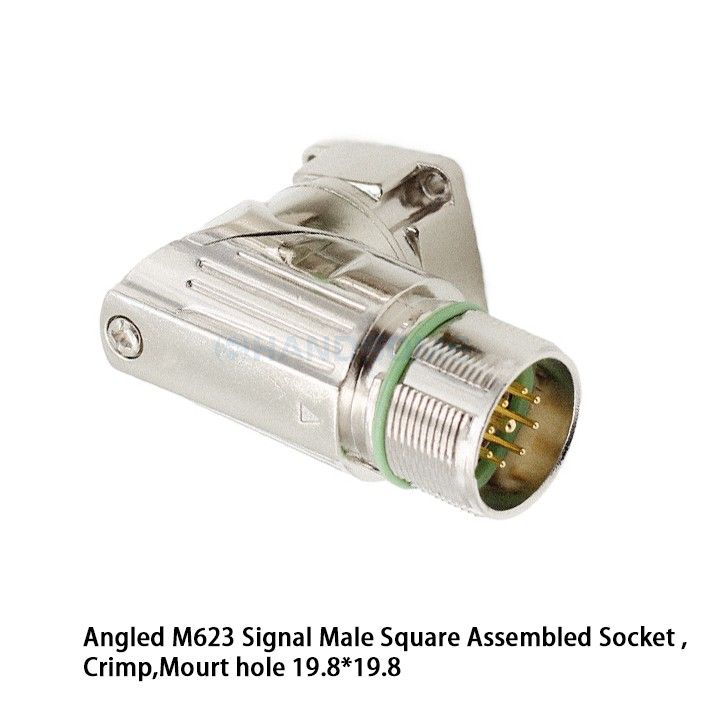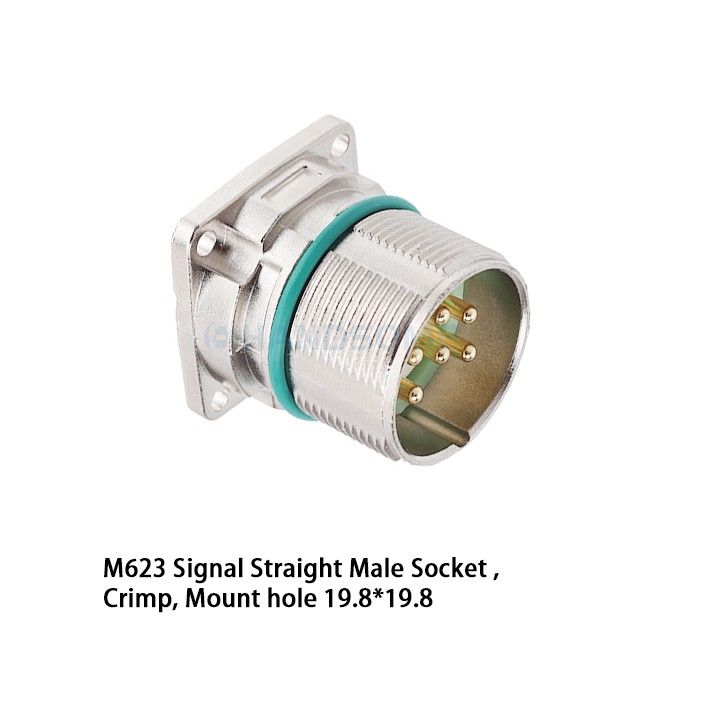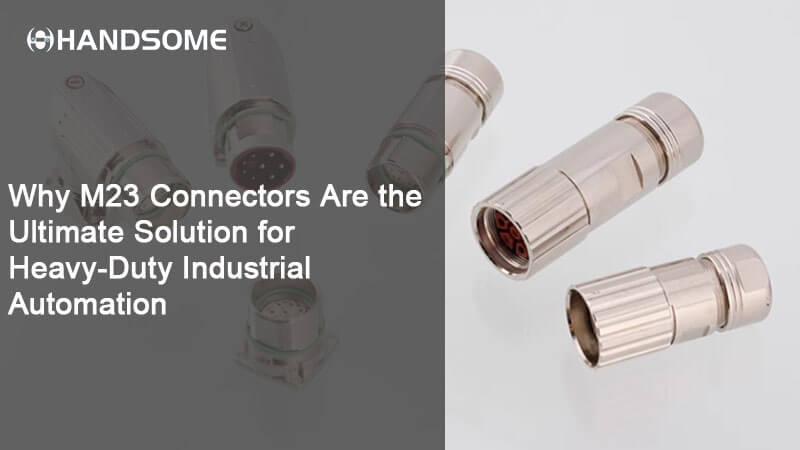Table of Contents
When you’re designing or maintaining industrial automation systems, connectors are often one of the unsung heroes of the whole operation.
Without reliable connections, no system—no matter how advanced—can function properly.
In heavy-duty industrial automation, you need connectors that can stand up to demanding environments, high power loads, and continuous wear.
This is where M23 connectors come in.
With their rugged design and versatile capabilities, M23 connectors are the ultimate solution for heavy-duty applications.
But don’t just take my word for it—let me explain why these connectors are a must-have for any serious automation system.

m23 Circular Connectors M623 Signal Straight Female Metal Assembled Plug
What Exactly Is an M23 Connector?
Before we dive into the specifics, let’s break down what an M23 connector is.
Essentially, the M23 connector is a circular connector commonly used in industrial automation systems for its ability to handle high power and signal transmission.
They’re known for their larger size (compared to M8 or M12 connectors) and the flexibility they offer with pin configurations—anywhere from 3 to 12 pins.
M23 plugs and sockets are the two primary types you’ll deal with.
The M23 plug typically connects the cable to your system, while the M23 socket connects the cable to another piece of equipment, like a motor, sensor, or control unit.
The beauty of these M23 circular connectors is their durability and the fact that they can be used for both power and signal transmission in a single connector.
Why M23 Connectors Are Ideal for Heavy-Duty Applications
When you’re working with robotics, industrial machines, or any other automation system that deals with heavy machinery or high-traffic environments, you need connectors that don’t just work—they need to last.
Here’s why M23 connectors are your best bet.
Built for Tough Environments
Heavy-duty automation systems often operate in environments where extreme conditions are the norm.
We’re talking about vibrations, shocks, temperature fluctuations, and exposure to dust and moisture.
Trust me, I’ve worked on more than a few projects where equipment gets put through the wringer.
I once helped set up an automated conveyor system in a food processing plant.
The system ran 24/7, and we had to deal with frequent washdowns, vibrations from the machinery, and high temperatures.
We went with M23 connectors for their IP67/IP68 ratings, which offer excellent protection against water and dust.
Those connectors performed flawlessly, and the plant was able to run smoothly without worrying about downtime due to connection issues.
High-Current and High-Voltage Capability
A big selling point for M23 connectors is their ability to handle high power.
Many of the machines in industrial automation require a lot of power to keep things running.
Whether it’s a large robot, motor, or conveyor system, you need a connector that can deliver consistent and reliable power.
M23 connectors support high current ratings (up to 16A) and voltage ratings (up to 630V AC/DC), which is critical for systems that operate with heavy machinery.
I recall a project involving a robotic arm used in automotive assembly.
We needed to run both power and control signals through the same connector.
The M23 power connector provided the perfect solution, handling both the electrical load and the signal transmission without issue.
Vibration and Shock Resistance
Industries like automotive manufacturing, aerospace, and materials handling involve constant vibrations, so connectors need to stay securely in place and continue to function despite those forces.
One of the best things about M23 connectors is their vibration resistance.
Their robust locking mechanisms ensure that even under heavy movement, connections remain intact.
When I was setting up a robotic system on an automotive production line, we chose M23 plugs and sockets specifically for their ability to resist vibrations.
Other connectors in the market simply couldn’t guarantee the same level of reliability, which was a dealbreaker for the project.
The M23 connectors handled the job without a hitch, and the production line ran smoothly without any electrical disconnects.
Flexibility and Versatility
The M23 connector is flexible in terms of its pin configuration and versatility.
Depending on your needs, you can select M23 circular connectors with 3, 5, 8, or even up to 12 pins.
This makes them suitable for various types of connections—from simple power distribution to more complex setups requiring both data and power transmission.
During a recent project that involved integrating sensors into an automated assembly line, we used M23 connectors with 12 pins.
These connectors allowed us to carry both the power needed for the motors and the signals required for feedback systems—all through one connector.
It simplified the wiring, reduced the risk of errors, and streamlined installation.
M23 Connectors in Real-World Applications
Robotics and Automated Machinery
Robotics is an area where M23 connectors truly shine. These systems demand connectors that can handle high power (for motors and actuators) and signal transmission (for control and sensors).
An M23 connector can take both of those needs and roll them into one, saving you space and simplifying your system design.
I’ve worked on robotic arms used in assembly lines, where M23 power connectors were essential for reliable operation.
These robots moved heavy components, and they required both power and data feeds to function properly.
With M23 connectors, the robots ran smoothly, without any interruptions due to connection issues.
Conveyor Systems
In industries like packaging, mining, and materials handling, conveyor systems are essential.
These systems often rely on heavy-duty motors that require reliable power transmission.
M23 connectors provide the necessary high-current capability to handle the power demands while also supporting signals for things like speed control or position sensors.
For a project in a mining facility, we used M23 connectors to manage both motor control and sensor feedback for the conveyor system.
The environment was dusty and humid, but the M23 circular connectors provided excellent resistance to both elements, ensuring the system continued to run efficiently.
CNC Machines
CNC machines require extremely precise control, and they often use multiple actuators, motors, and sensors that need to work in harmony.
M23 connectors, with their higher pin count, allow multiple signals to be carried alongside power without any interference.
When I was setting up a CNC milling machine in a factory, we opted for M23 connectors for both power and signal connections.
These connectors ensured smooth communication between the machine’s control unit and its motors, helping maintain precision and reducing downtime.
Why M23 Connectors Are Worth the Investment
One of the main concerns I hear from buyers is cost. However, when you consider the longevity and reliability of M23 connectors, they actually end up being a more cost-effective solution in the long run.
I’ve worked with various types of connectors over the years, and let me tell you—cheap connectors that don’t stand up to the rigors of industrial environments are a nightmare.
M23 connectors, on the other hand, offer a great balance of durability, performance, and price.
If you’re managing a large-scale automation project, the cost of M23 plugs and sockets can be offset by reduced maintenance costs and fewer failures. Plus, with bulk purchasing options, you can save even more.
Choosing the Right M23 Connector for Your Application
Selecting the right M23 connector for your system comes down to understanding your needs. Consider these factors:
- Electrical Requirements: Choose connectors based on the current and voltage your system will require.
- Environmental Factors: If your system operates in a harsh environment, look for M23 connectors with IP67/IP68 ratings for protection against dust and moisture.
- Pin Configuration: Depending on your needs, select an M23 plug or socket with the appropriate number of pins. More pins are needed for complex systems that handle both data and power.
- Size and Mounting Style: M23 connectors are available in panel mount and field mount versions, giving you flexibility in installation.

m23 Power Connector M623 Signal Straight Female Socket
Conclusion
In the world of heavy-duty industrial automation, M23 connectors are truly the ultimate solution.
With their ability to handle high power, resist harsh environments, and offer versatility in configuration, these M23 circular connectors are a critical component in any system that demands reliability and performance.
Whether you’re working with robotics, conveyor systems, or CNC machines, investing in M23 plugs and sockets will ensure your systems run smoothly and efficiently.
If you’re looking to boost the reliability of your industrial automation systems, I highly recommend considering M23 connectors for your next project.
They might just be the most important investment you make.
